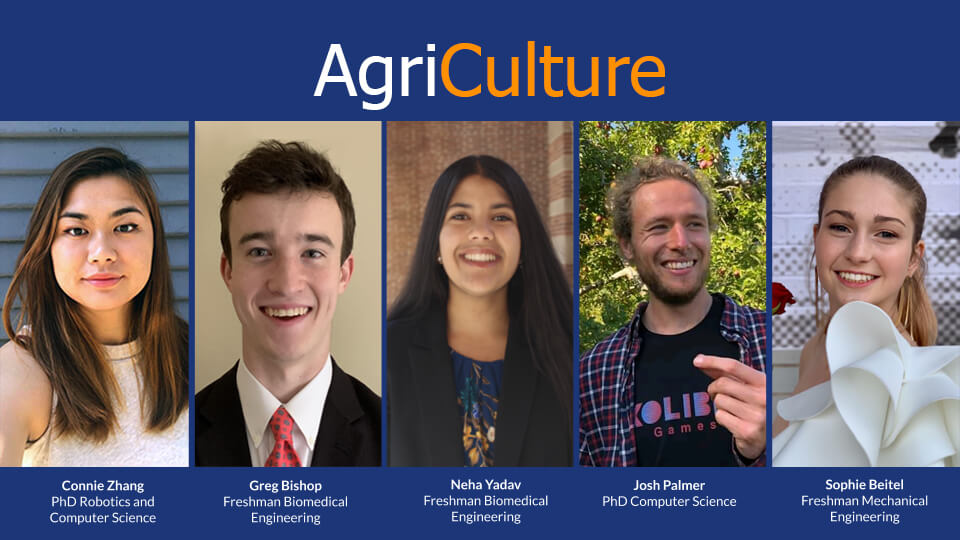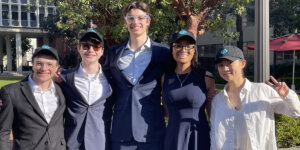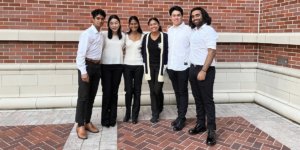
Team AgriCulture won this year’s MFC (Photo/Courtesy of Connie Zhang)
According to experts, far too many low-income, urban residents subsist on unhealthy foods high in saturated fats, salt and calories.
Part of the problem is location: in poor neighborhoods, there are more fast-food restaurants than organic markets. However, a bigger culprit, according to a 2019 joint-study by Stanford University, the University of Chicago and New York University, is a general lack of knowledge; people living in the inner-city often are not exposed to information about nutrition or where to find affordable fresh fare that would lead them to make better eating choices.
AgriCulture hopes to change that. Composed of five USC Viterbi students, the team aims to reduce rates of heart disease, obesity, and diabetes among economically disadvantaged city-dwellers by teaching their children about the importance of good nutrition. Toward that end, AgriCulture has created a curriculum, video games and testing kits for middle school students, with the belief that nutritionally savvy boys and girls will encourage their parents to serve fewer burgers and more Brussel sprouts and broccoli. The group’s materials also include information to link the students with nearby community urban gardens and other affordable sources of fresh food.
“We want to make this idea a reality and help as many students as we can,” said AgriCulture co-founder, Sophie Beitel, a freshman majoring in mechanical engineering. The new business, which also includes Neha Yadav, a freshman studying biomedical engineering; Greg Bishop, also a freshman BME major; and Connie Zhang and Josh Palmer, both Ph.D. students in computer science, aims to land a contract with the Los Angeles Unified School District.
AgriCulture’s vision won the team the $50,000 grand prize at the 2020 Min Family Engineering Social Entrepreneurship Challenge, a business model contest that encourages would-be social entrepreneurs to build businesses to benefit the underprivileged locally, nationally and even worldwide. The event was held April 27 over Zoom.
USC Viterbi Dean Yannis C. Yortsos said he believes that MFC gives USC Viterbi students “a new way of solving societal problems through the lens of social entrepreneurship using engineering innovation. It is likely the only such competition nationwide.”
This year’s MFC began in October, with 60 students initially signing up. Unlike past years, participants did not need a specific idea when they applied. Instead, they formed teams and developed projects after customer discovery and other workshops. Each of the six finalist teams had at least one USC Viterbi undergraduate or graduate student.
“You know what I am so impressed with?” asked Trina Gregory, MFC program manager. “The strong sense of purpose these teams have in making a difference, and their commitment to sustainable development goals.”
MFC launched in October 2015 with a generous gift from Bryan Min, B.S. ISE ’86 and a member of the USC Viterbi Board of Councilors, and his family: his wife Julie Min; their son Brandon, a USC Viterbi graduate in industrial systems engineering; and daughter Brittany, a senior USC Renaissance Scholar candidate dual majoring in cognitive science and music industry.
This year’s theme was inspired by the 2030 Agenda for Sustainable Development, a universal call to action to end poverty, protect the planet and improve the lives of people everywhere.
“The students really stretched into areas that weren’t familiar with and really delved into them,” said Susan Angus, executive director of the Commission on Voluntary Service & Action, a coordinating council of non-governmental volunteer organizations across the country. “I think and hope they’ll be more ethical engineers in the future and help achieve the 2030 Sustainable Development Goals.
“The students were genuinely concerned, and their projects were on target,” added Angus, who served on the MFC Steering Committee and suggested the 2030 Sustainable Development Goals theme.
The other 2020 MFC finalists included:
BudgetBites: An app that ensures left over food from on-campus events goes to students in need
KELM Labs: Experiment kits that combine online instructional learning with safe, hands-on experience
SustainAbility: An app to help people be sustainable in terms of their water and power usage
VisionCultura: Micro-garden to grow plants and vegetables more easily from home
Filtrate: An improved water filter design that will remove contaminants and make water safer to drink
The 2020 MFC’s local focus contrasts with those of recent challenges.
Last year, the challenge focused on the world’s growing refugee crisis. As part of a special class, CE 499: Engineering Innovation for Global Challenges, students went to Lesvos, Greece, to meet with refugees and devise innovative solutions to meet the needs of people in crisis. In 2018, MFC took USC Viterbi and other students to Texas to meet with Hurricane Harvey survivors. Participants focused on developing sustainable ventures to enhance relief and recovery efforts for victims of that and other natural disasters.
This year’s MFC participants attended workshops developed by Innovation Node-Los Angeles that focused on customer acquisition, storytelling, law and business modeling. The students also heard from several guest speakers, including Andrea Leon-Grossmann, deputy director of Azul, who spoke about problems of water quality in low-income areas, and Danny Hom of GRID Alternatives Greater Los Angeles, who talked about making solar energy affordable and available to low-income communities.
In recent years, USC Viterbi has become a burgeoning center of innovation and entrepreneurship. With the Maseeh Entrepreneurship Prize Competition, the NSF I-Corps Node headquartered on campus and the Viterbi Startup Garage, USC Viterbi students have more opportunities than ever to develop innovative business models and explore commercialization of technologies.
At the end of this year’s challenge, MFC namesake Bryan Min encouraged participants to continue to aim high.
“I think all of you are so talented and are receiving this great education from USC,” he said. “So, continue to fight on and impact our world.”
Published on May 1st, 2020
Last updated on April 7th, 2022










